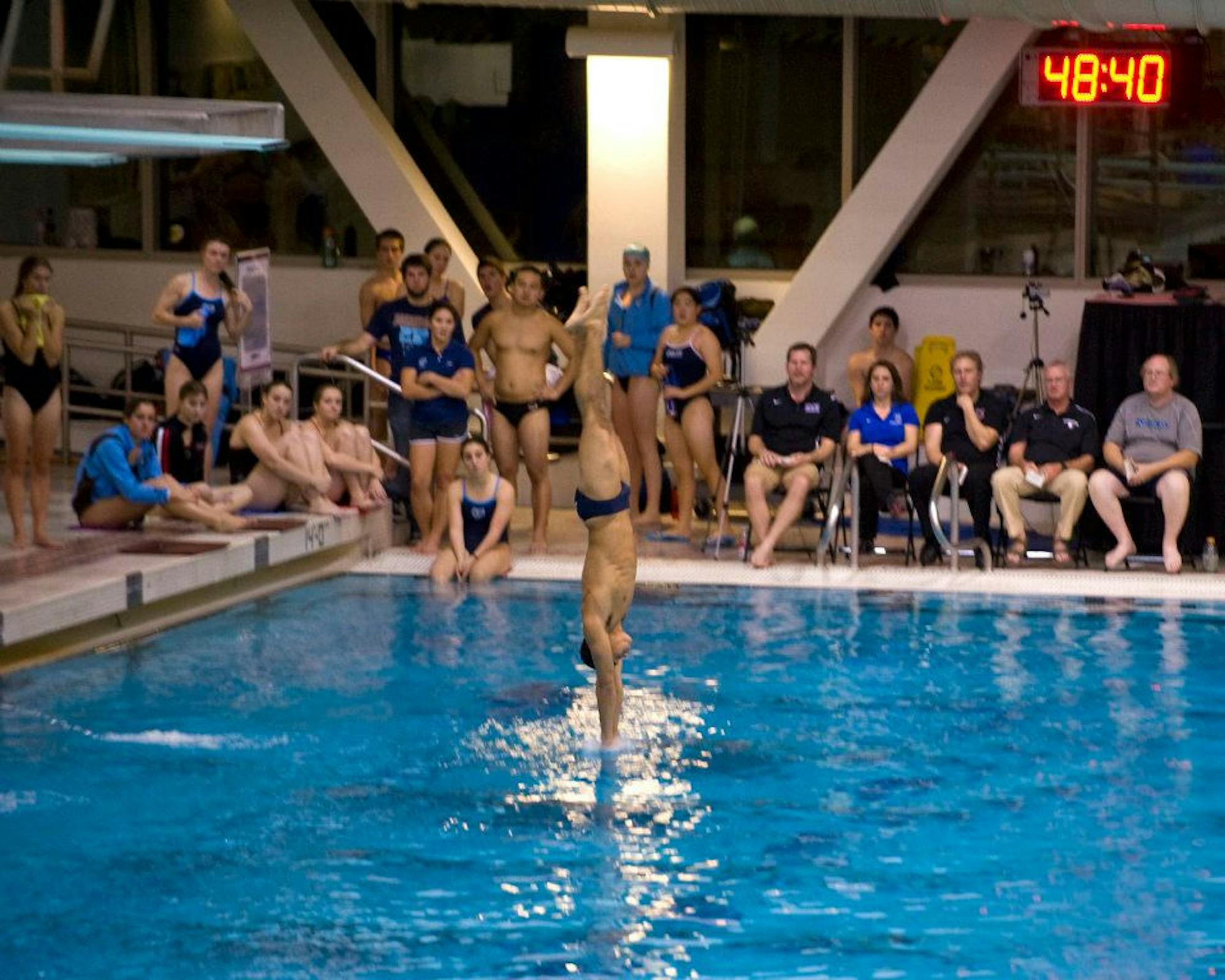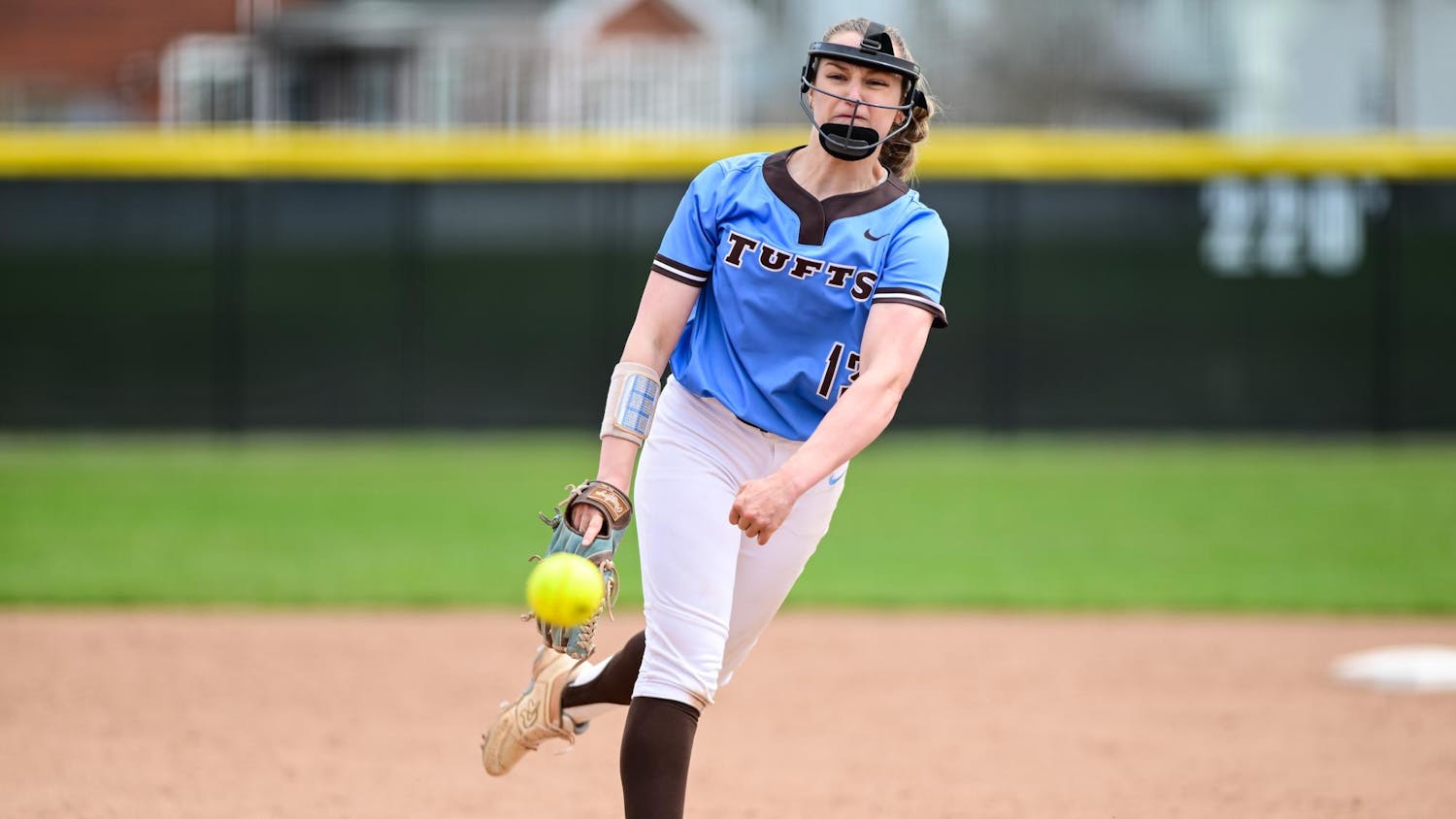For many collegiate swimming and diving programs, swimming often receives more attention than diving. But at Tufts, it’s the divers that have stolen the show in recent years, dominating the competition in the NESCAC and claiming a number of NCAA titles under the tenure of diving coach Brad Snodgrass.
Last year’s NCAA national championships epitomize that success. Despite the fact that the men’s team sent just as many divers as it did swimmers to the meet, Tufts divers Johann Schmidt (LA ’14) and sophomore Matt Rohrer — competing then as a first-year in his first ever NCAA championship — were responsible for 49 of the team’s 50 points in Indianapolis.
Snodgrass, a former Massachusetts state high school diving champion and collegiate diver himself, joined the Tufts staff as an assistant coach in 1988 before becoming the head diving coach of both the men’s and women’s teams. In the last decade, his program has risen to establish a national reputation for itself as his divers have consistently been among the top Div. III competitors.
In 2008, Snodgrass coached Kendall Swett (LA ’08) to first place on both the one- and three-meter boards at the national championship. And just last year, Schmidt capped off a dazzling career as a Jumbo under the direction of Snodgrass when he won the one-meter NCAA title for the second time since 2012. Schmidt was also a seven-time All-American with six NESCAC titles in his illustrious career.
Yet Snodgrass remains humble about his program’s achievements, crediting the divers themselves more than his own coaching.
“I really think [it’s] the kind of students that come to Tufts,” Snodgrass said. “They’re very high achievers and they’re very success-oriented, so it’s pretty easy for me to get them to go in a successful direction. There [are] no scholarships involved, so people are there for the right reasons. They’re there because they want to be part of the team, they’re there because they want to contribute to the team and make themselves better at the same time.”
With Rohrer heading yet another strong class of divers this year, Snodgrass hopes the men’s team will be successful as it competes at the NESCAC championship this weekend and when both teams compete at the NCAA Zone Qualifiers the following weekend.
“I guess I would say I’m athlete-oriented,” Snodgrass said. “I don’t have a specific plan, or a one-size-fits-all plan, for each athlete. It’s important to find what motivates each diver and find what kind of feedback they’re going to thrive on. I’ve had divers complain that I don’t yell enough, and I’ve had others complain that I’m giving them too much feedback.”
“I try to work with each individual and find out what’s gonna work best for them, and just pay close attention to their improvement and keep giving them more [of the same] when I see them moving in the right direction, and [help] them on to where they want to be,” Snodgrass added.
Rohrer and first-year diver Aaron Idelson, who are both competing at Middlebury this weekend for the NESCAC championships, both stressed Snodgrass’ relaxed demeanor and generally informal approach to coaching.
“He’s just very relaxed about everything, in a kind of reassuring way,” Rohrer said. “We definitely respect him, but we don’t really see him as a strict coach figure. We like to call him ‘B-Rad.’ And I’m pretty sure I texted him something one time and he responded with something like ‘foshizzle.’”
“He’s definitely more relaxed than most coaches,” Idelson added. “He’s kind of a bro.”
Snodgrass believes that his coaching style has mostly developed to complement the pressure and high standards that his talented, driven divers place on themselves.
“I think Johann [Schmidt] had no problem working hard — he was an extremely hard worker, as most of these guys are,” Snodgrass said. “But he was always his own worst critic. So I felt like I was always trying to balance the critical voice inside his own head with confidence-building and positive feedback that he didn’t necessarily give himself.”
Snodgrass has taken a somewhat similar approach to coaching Rohrer.
“Matt’s made just an incredible, meteoric rise. He did almost no club diving prior to coming to Tufts. And he learned his entire three-meter list from scratch last year, to the point that he was nearly a finalist at the national championship last year. And if you’ve been around diving, [you’ll know] that’s just an impossible [feat]. I’ve only seen one other diver—that I’ve coached—make that kind of amazing leap in one year. So Matt clearly is incredibly talented, [but] he’s also tough on himself—he’s a perfectionist.”
Rohrer and Idelson explained that the job of a diving coach is often to help divers convince their body to disregard the mental fear of the jump and possible injury, and to remain confident in their physical ability. According to Rohrer and Idelson, Snodgrass takes a “blunt approach” to this task and is not afraid to push the divers when they need it.
“On training trip, for example, at our third practice he basically told us, ‘Okay, everyone’s gonna do their whole list, all 11 dives,’ which is crazy considering we hadn’t dove for a month,” Rohrer said. “But we went out and did it, and it forced us back into form.”
Despite his individual success coaching, Snodgrass does not hesitate to use his assistants.
“We always have assistant coaches at practice, and there are usually multiple people on deck at a time,” Rohrer said. “So after each dive he’ll ask other people, other divers, what they thought of our dives. He gets a bunch of different points of view, even if they’re different from his, and incorporates that into his feedback.”
Snodgrass’ coaching style is about to be put to the test again. He, Rohrer and Idelson are already up in Vermont; the latter two are competing in the one-meter event today.
“The mental preparation is more [important] than the physical at this point,” Idelson said. “We’ve been preparing all season, so now it’s crunch time.”
“This is the time to maybe try to fix the one little thing that’s making the dive an issue, but we can’t do any more than that,” Rohrer added.
By this evening, the crowd at Middlebury’s Natatorium will find out if the Jumbos have successfully defended the one-meter title that Schmidt won in 2014, 2012 and 2011. On Sunday, Rohrer will try to defend his three-meter title from last year.
“On a superficial level, I want to win off both boards,” Rohrer said. “But I also want to see Aaron do really well, because I think he’s capable of it. I think he can get top-four off both boards.”
Snodgrass is also excited to see his divers compete this weekend, and believes both Rohrer and Idelson are capable of qualifying for the national championship at next weekend’s Zone Qualifier meet in Springfield.
“At this time of the year, [the divers are] really ready,” Snodgrass said. “They trained really hard over winter break, so they’re really ready for the competition. The key is to stay healthy and mentally prepared, caught up on schoolwork so there’s not a lot of stress outside of the pool. So our goal is to show up healthy and mentally prepared, and the rest sort of takes care of itself.”
With Snodgrass at the helm, Tufts divers set for NESCACs and beyond

Tufts divers have experienced unprecedented success under coach Brad Snodgrass.





